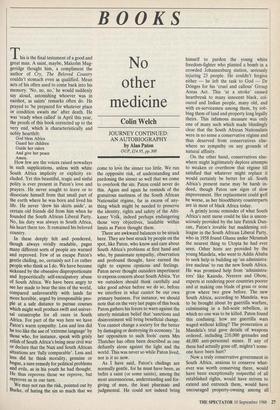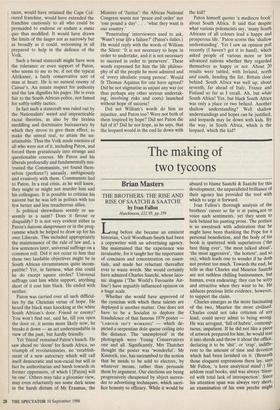BOOKS
No other medicine
Colin Welch
JOURNEY CONTINUED: AN AUTOBIOGRAPHY by Alan Paton
OUP, f14.95, pp.308
This is the final testament of a good and great man. A saint, maybe, Malcolm Mug- geridge thought him, a compliment the author of Cry, The Beloved Country couldn't stomach even as qualified. Mean acts of his often used to come back into his memory. 'No, no, no,' he would suddenly say aloud, astonishing whoever was in earshot, as saints' remarks often do. He prayed to 'be prepared for whatever place or condition awaits me' after death. He was 'ready when called' in April this year, the proofs of this book corrected up to the very end, which is characteristically and nobly heartfelt:
God bless Africa Guard her children Guide her rulers And give her peace Amen.
How few are the voices raised nowadays in such supplications, unless with white South Africa implicity or explicity ex- cluded. Yet this beautiful, tragic and sinful polity is ever present in Paton's love and prayers. He never sought to leave or to dissociate himself from that small part of the earth where he was born and lived his life. He never 'drew his skirts aside', as certain old friends did from him when he founded the South African Liberal Party. No, his duty was always in South Africa, his heart there too. It remained his beloved country.
In these deeply felt and pondered, though always vividly readable, pages many different sorts of people are warned and reproved. Few of us escape Paton's gentle chiding, no, certainly not I or rather people who think as I do. We have become sickened by the obsessive disproportionate and hypocritically self-exculpatory abuse of South Africa. We have been angry to see her made to bear the sins of the world, compared unfavourably with lands far more horrible, urged by irresponsible peo- ple at a safe distance to pursue courses which might well produce swift and univer- sal catastrophe for all races in South Africa. For part of the way here we have Paton's warm sympathy. Less and less did he too like the use of 'extreme language' by those who, for instance, speak with grisly relish of South Africa's being near civil war or declare that the Nazi and South African situations are 'fully comparable'. Less and less did he think morality, genuine or bogus, a sure remedy for political problems and evils, as in his youth he had thought. He thus reproves those we reprove, but reproves us in our turn.
We may not run the risk, pointed out by Burke, of hating the sin so much that we come to love the sinner too little. We run the oppposite risk, of understanding and pardoning the sinner so well that we come to overlook the sin. Paton could never do this. Again and again he reminds of the gratuitous nastiness of the South African Nationalist regime, far in excess of any- thing which might be needed to preserve the identity, rights and safety of the Afri- kaner Volk, indeed perhaps endangering those very objectives, laudable within limits as Paton thought them.
There are awkward balances to be struck here. They are best struck by people on the spot, like Paton, who know and care about South Africa's problems at first hand and who, by passionate sympathy, observation and profound thought, have earned the right to express opinions and feelings. Paton never thought outsiders impertinent to express concern about South Africa. Yet we outsiders should think carefully and take good advice before we do so, before we interfere in what cannot be our own primary business. For instance, we should note that on the very last pages of this book Paton gathers his forces to warn against the utterly mistaken belief that 'sanctions and disinvestment will bring beneficial change. You cannot change a society for the better by damaging or destroying its economy.' In her opposition to such fools' cures Mrs Thatcher has often been described as one defiantly alone against the light and the world. This was never so while Paton lived, nor is it so now.
As I have said, Paton's chidings are normally gentle, for he must have been, as befits a saint (or some saints), among the most uncensorious, understanding and for- giving of men, the least pharasaic and judgmental. He could not indeed bring himself to pardon the young white freedom-fighter who planted a bomb in a crowded Johannesburg station, seriously injuring 23 people. He couldn't forgive either — he left the task to God — Dr D6nges for his `cruel and callous' Group Areas Act. This `at a stroke' caused heartbreak to many innocent black, col- oured and Indian people, many old, and with ex-servicemen among them, by rob- bing them of land and property long legally theirs. This infamous measure was only one of many such which made blindingly clear that the South African Nationalists were in no sense a conservative regime and thus deserved from conservatives else- where no sympathy on any grounds of natural affinity.
On the other hand, conservatives else- where might legitimately deplore attempts to weaken or overthrow that regime till satisfied that whatever might replace it would certainly be better for all. South Africa's present nurse may be harsh in- deed, though Paton saw signs of slow improvement. Her replacement could well be worse, as her bloodthirsty counterparts are in most of black Africa today.
A grimly ironic reminder of what South Africa's next nurse could be like is uncon- sciously provided by the late Patrick Dun- can, Paton's lovable but maddening col- league in the South African Liberal Party, who in 1958 found Ghana under Nkrumah the nearest thing to Utopia he had ever seen. Other hints are provided by the young Mandela, who went to Addis Ababa to seek help in building up `an administra- tive nucleus' to run the new South Africa. He was promised help from 'administra- tors' like Kaunda, Nyerere and Obote, experts at rendering poor countries poorer and at making one blade of grass or none grow where two grew before. The new South Africa, according to Mandela, was to be brought about by guerrilla warfare, culminating in a full-scale rebellion, in which no one was to be killed. Paton found this confusing: how are guerrilla wars waged without killing? The prosecution at Mandela's trial gave details of weapons ordered, including 210,000 grenades and 48,000 anti-personnel mines. If any of these had actually gone off, mightn't some- one have been hurt?
Now a truly conservative government in South Africa, anxious to conserve what- ever was worth conserving there, would have been exceptionally respectful of all established rights, would have striven to extend and entrench them, would have encouraged property-owning among all races, would have retained the Cape Col- oured franchise, would have extended the franchise cautiously to all who could be persuaded to endorse or endure a status quo thus modified. It would have drawn the limits of the laager not as narrowly but as broadly as it could, welcoming in all prepared to help in the defence of the Volk.
Such a broad statecraft might have won the tolerance or even support of Paton, who seems to me to be, if not the typical Afrikaner, a fairly conservative sort of man at heart. He is no natural enemy of Caesar's. An innate respect for authority and the law dignifies his pages. He is even fair to the South African police, not famed for softly-softly tactics.
In fact such a statecraft was ruled out by the Nationalists' weird and impracticable racial theories, as also by the tireless meddling and doctrinaire bureaucracy by which they strove to give them effect, to make the unreal real, to attain the un- attainable. Thus the Volk made enemies of all who were not of it, including Paton, and forced them gratuitously into strange and questionable courses. Mr Paton and his liberals profoundly and fundamentally mis- trusted the Communists, yet found them- selves (perforce?) uneasily, ambiguously and evasively with them. Communists lied to Paton. In a real crisis, as he well knew, they might or might not murder him and his colleagues. It is possible to criticise his naivete but he was left in politics with too few better and less treacherous allies.
Is political shrewdness seemly or un- seemly in a saint? Does it favour or disqualify? It is not very evident either in Paton's liaisons dangereuses or in the prog- ramme which he helped to draw up for his own Liberals. This included appropriately the maintenance of the rule of law and, a few sentences later, universal suffrage on a common roll. Did it not occur to him that these two laudable objectives might be in South African circumstances quite incom- patible? Yet, in fairness, what else could he do except square circles? Universal suffrage cost him white support, anything short of it cost him black. He ended with neither.
Paton was carried over all such difficul- ties by the Christian virtue of hope. He heard the black man knocking at the white South African's door. Friend or enemy? You won't find out, said he, till you open the door or, it seems more likely now, he breaks it down — an act understandable in view of the past, but hardly friendly.
Yet 'friend' remained Paton's hunch. He saw ahead no 'doom' for South Africa, no triumph of revolutionaries, no 'establish- ment of a new autocracy which will call itself democratic and non-racial but will in fact be authoritarian and harsh towards its former oppressors, of which I [Paton] will be one'. Others may take a gloomier view, may even reluctantly see some dark sense in the harsh dictum of Mr Erasmus, the Minister of 'Justice': the African National Congress wants not 'peace and order' nor `one pound a day' . . . 'what they want is our country.'
'Penetrating' interviewers used to ask, `Wasn't your life a failure?' (Paton's italics.). He would reply with the words of William the Silent: 'It is not necessary to hope in order to undertake, and it is not necessary to succeed in order to persevere'. These words expressed for him the life philoso- phy of all the people he most admired and of 'every idealistic young person'. Would St Thomas Aquinas for one have agreed? Did he not stigmatise as unjust any war (or thus perhaps any other serious undertak- ing, involving risks and costs) launched without hope of success?
Did not William's words do him an injustice, and Paton too? Were not both of them inspired by hope? Did not Paton die full of it? Did he not hope, as he says, that the leopard would in the end lie down with the kid?
Paton himself quotes 'a mediocre book' about South Africa. It said that despite what various polemicists say, 'many South Africans of all colours lead a happy and prosperous life.' Paton scorns this 'shallow understanding'. Yet I saw an opinion poll recently (I haven't got it to hand), which asked people of various more or less advanced nations whether they regarded themselves as happy or not. About 20 results were tabled, with Ireland, north and south, heading the list, Britain close behind. South Africa was well up, about seventh, far ahead of Italy, France and Finland so far as I recall. Ah, but white South Africa! Yes, but black South Africa was only a place or two behind. Another shallow understanding? Well shallow understandings and hopes can be justified, and leopards may lie down with kids. By the way, in South Africa, which is the leopard, which the kid?























































 Previous page
Previous page